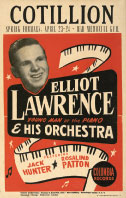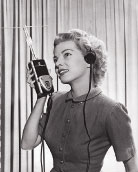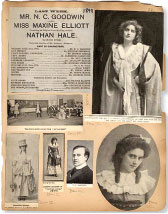Though located on Newman's first floor, Special Collections is easily enough overlooked unless you are engaged in archival research. Nevertheless, the ever-expanding collections contain something of interest to most everyone, all of it in support of the university's mission of research, teaching, and service, and much of it, regardless of one's level of expertise, genuinely educational and entertaining. Part of Tech's Digital Library and Archives (DLA), funded initially as the Scholarly Research Project, Special Collections houses not only the University Archives, but also several history collections that are under steady development by the university. As a result, notes Eileen Hitchingham, dean of the University Libraries, "Virginia Tech has many important pieces of the country's and the world's history." The University Archives To the surprise of many alumni, Special Collections houses more than just materials that only professional researchers find exciting. For starters, the University Archives--a text-and-image history of Virginia Tech and its administrators, board of visitors, faculty, and alumni--is always growing and, best of all, nearly fully accessible from Special Collections' website.
The core of the collection is comprised of the papers of the university's former presidents--from the "father of VPI," John M. McBride, whose presidency began in 1891, through Paul B. Barringer, Joseph D. Eggleston, Walter S. Newman, and T. Marshall Hahn, whose service ended in 1974. (The papers of the school's presidents before 1891 were lost in a 1905 fire.) Other topics and items of particular interest accessible electronically in the archives are descriptions and images of VPI cadet uniforms during the university's first century; digitized versions of student yearbooks, The Bugle, from 1895 to 1900, and The Tin Horn, the annual of Tech's women students, from 1925 and 1929-1931; memories of political unrest on campus in 1970; complete histories of the university's academic departments; and a series dedicated to cultural diversity on campus, which features images, oral histories, and timelines of Tech's minority student population over the years, including the first female students, first black students, and first international students. Most certainly, the archives' photographs, correspondence and diaries, oral histories (both tapes and transcripts), meeting minutes, press releases, newspaper clippings, scrapbooks, faculty publications, university publications, and even student theses and dissertations bring Tech to life, for either the reminiscing Hokie or the professional researcher. Also storing relevant biographical information on current Tech personnel, the University Archives is, in a nutshell, the place for learning more about the university, both past and present. Besides providing a comprehensive listing of the materials available in the archives, Special Collections maintains an electronic database of images--known as ImageBase--that features digitized materials from many of the library's collections. The thousands of entries include, for instance, more than 900 images of Appalachian history and more than 5,000 images from the Virginia Agricultural Extension Service, all of which can be browsed by visiting http://imagebase.lib.vt.edu/.
 Put simply, users interested in a variety of disciplines and subject areas can research or just "visit" the past without even leaving their desks. To access the University Archives electronically, visit the guide at http://spec.lib.vt.edu/archives/guide/. To browse the Electronic Exhibitions, go to http://spec.lib.vt.edu/specgen/exhibit.htm. Despite the convenience that Internet research affords, many believe that browsing through Special Collections in person is more productive, if not just more fun. And it's a sure bet that alumni will be prompted down memory lane by the archived series of original posters that advertise campus dances held during social weekends in the 1940s and 1950s, as well photographs and memorabilia of student life and activities over the decades, such as leather-bound yearbooks and programs from football games. The American History Collection
Correspondingly, the Appalachian Collection, which is among one of three specialized archives maintained by Special Collections, features nearly 300 manuscript collections of personal and family papers, business records, photographs, oral history tapes and transcripts, rare books, and local publications. Covering Southwest Virginia, Western North Carolina, East Tennessee, the northeast corner of Alabama, the northwest corner of South Carolina, North Georgia, Southern Ohio, Eastern Kentucky, Western Maryland, and West Virginia, the materials focus on the arts, folklore, literature, religion, and economic, social, and political development in the region, including special recognition of the minority and ethnic experience. A significant part of the region's history is also preserved in the archives of the Norfolk and Western and the Southern Railway systems, which consist of the records of more than 100 railroads and coal companies in Appalachia. The records are enhanced by more than 10,000 vintage photographs, painting a pictorial history of the railroad's development in the United States. Now, for something completely differentA major collection in both size and appeal is the library's William J. Heron Collection of Speculative Fiction, whose core texts were donated by a private collector in North Carolina. Comprised of approximately 16,000 American, British, and Australian books and magazines dating from the 1920s into the 1980s, this collection showcases printed material that either belongs to or examines the science fiction, fantasy, and horror genres. Featuring adventure, espionage, lost worlds, undiscovered lands, utopias, and futuristic technology, among other thrilling subjects, this collection--which includes such titles as Ghost Super Detective, Weird Terror Tales, and Wonder of the Space Ways--preserves these popular genres that inhabit a significant place in most English-speaking cultures.
World-class research In keeping with its long history of research, Tech is fortunate to hold a trio of specialized archives (which includes the Appalachian Collection) that in good part speaks to the university's academic strengths. The Archives of American Aerospace Exploration (AAAE) preserve those original materials--correspondence, notes, photographs, memorabilia, and oral histories--that document the country's aeronautical and space history firsthand. The collection, begun in 1986 upon receipt of the papers of Christopher C. Kraft Jr. (aeronautical engineering '44), a former director of the Johnson Space Center in Houston, is comprised of the papers of NASA administrators, astronauts, test pilots, and others who participated in the aerospace business and industry from the 1930s onward.
Of special significance in the AAAE are the papers of Michael Collins, a Gemini and Apollo astronaut, former director of the National Air & Space Museum, and recipient of the Presidential Medal of Freedom. Alongside a range of aerospace memorabilia and instruction manuals from Collins' Air Force and NASA training are transcripts, audio recordings, texts, and photographs from the Gemini X and Apollo XI flights, for which Collins was pilot and command module pilot, respectively. In addition, Special Collections continues to build the International Archives of Women Architects (IAWA), founded in 1988, which preserves the history of women's involvement in architecture worldwide, particularly those pioneer female architects of the early 20th century. Housing more than 175 collections representing the work of not only architects, but landscape architects, designers, architectural historians and critics, and urban planners, the IAWA received a windfall last year with the donation of the papers and design archives of New Jersey's first female licensed architect and owner of her own architectural firm, Eleanore Pettersen. A former apprentice to Frank Lloyd Wright, Pettersen is perhaps best know for designing what eventually became the home of President Richard M. Nixon in Saddle River, N.J. As the custodian of Pettersen's project files, drawings, and blueprints, Special Collections has also received a sizable donation from the architect's heirs that will support the processing and preservation of the collection. So you're thinking you've always wanted to know more about your alma mater ... the Civil War ... space travel ... the history of rural Appalachia ... the walkie-talkie? What are you waiting for? Digitizing the goods
A product of the first grant is the Virginia Heritage Project, which makes available guides to every manuscript and archival collection in the commonwealth's universities and other state institutions. The project, funded in part by a National Endowment for the Humanities grant, well prepared the participants working on DLA's second ASPIRES grant. Joined by the co-director of the South Atlantic Humanities Center (SAHC), Anita Puckett of Tech's Center for Interdisciplinary Studies, McMillan directs the development and regional distribution of state-of-the-art software to SAHC member institutions to create researcher-friendly databases of manuscripts and archival finding aids. Ultimately, the goal of the project is to strengthen Virginia Tech's overall presence in humanities research and education. |
|||||||||||||||||||||||||||






